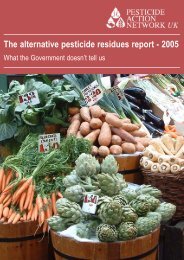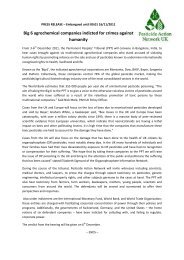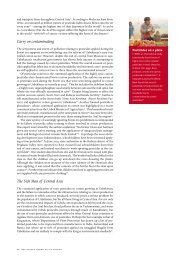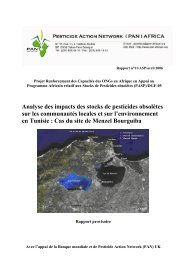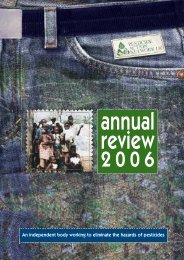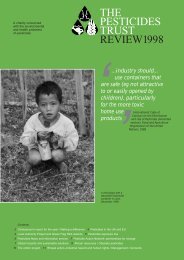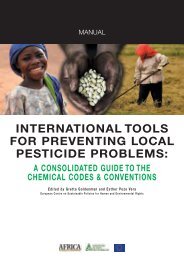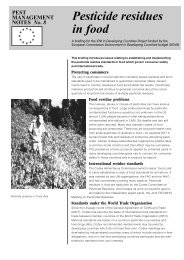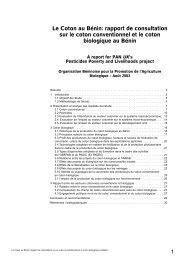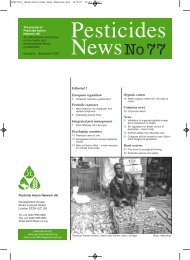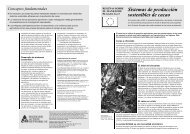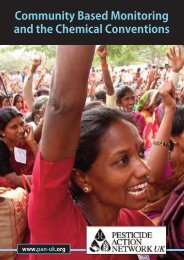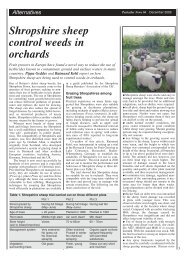Tanzania Multi Stakeholder Map - WebNG
Tanzania Multi Stakeholder Map - WebNG
Tanzania Multi Stakeholder Map - WebNG
You also want an ePaper? Increase the reach of your titles
YUMPU automatically turns print PDFs into web optimized ePapers that Google loves.
Registration and Control<br />
• Responsibility for approval and registration of agricultural<br />
pesticides is given by law to the Ministry of Agriculture and<br />
Food Security and the Tropical Pesticides Research Institute<br />
(TPRI). A board takes the formal registration decisions.<br />
• TPRI’s responsibility includes also pesticide use directives,<br />
permits, quality control of pesticides (formulation analyses), and<br />
training activities.<br />
• TPRI, Ministry of Agriculture and Food Security, and regional<br />
research stations have the main responsibility for applied<br />
research regarding pesticide use<br />
• The National maximum limits for pesticide residues in food are<br />
established by Bureau of Standards and TPRI. Food residues are<br />
monitored by TPRI, <strong>Tanzania</strong> Bureau of Standards, the<br />
Government Chemist and the National Food Control Commission<br />
in <strong>Tanzania</strong>.<br />
• Quality control of pesticide products (formulation analysis) is<br />
Focal Points for Information Dissemination and<br />
International Liaison<br />
• National focal points for the Intergovernmental Forum on<br />
Chemical Safety (IFCS) is the Factories Inspectorate<br />
(Ministry of Labour and Youth Development) in<br />
<strong>Tanzania</strong>.<br />
• <strong>Tanzania</strong> also has a Poisons Centre, which is the<br />
<strong>Tanzania</strong> Drug and Toxicology Information Service<br />
(TADATIS).<br />
• <strong>Tanzania</strong> has a national association of pesticide<br />
manufacturers and importers which is the Agrochemical<br />
Association of <strong>Tanzania</strong> (AAT).CropLife<br />
• POPs focal points for liaison with UNEP Chemicals’<br />
persistent organic pollutants programme: Division of<br />
Environment (Vice President’s Office), Cleaner<br />
Production Centre of <strong>Tanzania</strong>, and Department of Plant<br />
Protection (Ministry of Agriculture and food Security).<br />
performed by TPRI in <strong>Tanzania</strong>.<br />
13<br />
14<br />
Table:<br />
NGOs and Trade Unions<br />
• ENVIROCARE<br />
• AGENDA for Environment and<br />
Responsible Development (AGENDA)<br />
• <strong>Tanzania</strong> Plantation and Agricultural<br />
Workers Union (TPAWU)<br />
• LEAT<br />
• TAWLAE<br />
• ASP (T) Network (capacity)<br />
15<br />
NGO Activities<br />
• Research on the pesticides<br />
• Awareness raising materials including brochures,<br />
news articles, leaflets, facts sheets preparation and<br />
dissemination to different stakeholders in both English<br />
and Kiswahili<br />
• Presentation of study reports to communities and<br />
other national stakeholders<br />
• Presentation of the solution and study reports at<br />
different fora<br />
• Holding workshops, press conferences and interviews<br />
with media<br />
• Production and release of newsletter on general<br />
chemical management and alternatives among other<br />
issues<br />
• Training of Trainers<br />
16<br />
International Agencies<br />
International Convention Status<br />
• Food and Agriculture Organisation<br />
of the United Nations (FAO)<br />
• Intergovernmental Forum on<br />
Chemical Safety (IFCS)<br />
• UNEP<br />
• UNDP and<br />
• World Bank,<br />
• The <strong>Stakeholder</strong> Convention<br />
• The Rotterdam Convention<br />
• The Basel Convention<br />
• The Bamako Convention<br />
• International Code of Conduct (FAO Code)<br />
17<br />
18<br />
133




